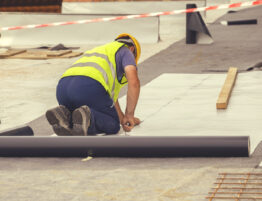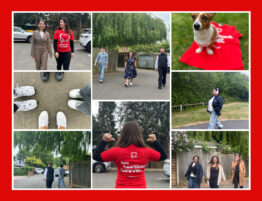
Having a well-functioning team is one of the most important factors which the success of any construction project relies on.
It’s how people from all kinds of backgrounds, with different skills and experience, find a way to work and cooperate with each other to reach a common goal; and how they maintain high levels of productivity, alongside excellent quality control and safety practices.
However, achieving and maintaining great teamwork does require some effort so, in today’s blog, we’ve got five tips for you.
1. Communication
Top of the list comes clear communication. Everyone within the team should be kept well-informed, not only about the things that are particularly relevant to them such as what is expected of them in their daily tasks, but also about ‘big picture’ items such as the overall vision and goals for the project.
As the project moves forwards, it’s important to keep people up-to-date with progress reports and any changes or other issues that might arise (e.g. around materials or quality). Keeping everyone on the same page like this will ensure any problems are dealt with quickly and be motivating for the team.
Pre-construction meetings, kick-off meetings, site inductions, toolbox talks, online platforms and group chats can all be used to maintain effective communication across a construction team.
2. Trust
Another important aspect of teamwork is trust. Where there is trust, you’ll usually find a positive work environment where people perform well, work efficiently and feel comfortable sharing their ideas or concerns.
Trust has to be built up and down the chain of command by consistent and transparent actions, for instance by managers that always practise open communication; actively seek out ideas and feedback from the team; and show they are willing to take suggestions on board.
Scheduling specific team building activities can be another way of building trust as well as encouraging collaboration within a team. This might be an organised session with an expert but could equally be something that’s built into the day-to-day operations – for instance, a demonstration of a working technique from one team member to others.
3. Understanding
Construction projects involve many different groups of people so, to work well together, everyone needs to have a good understanding of their own role/ responsibilities as well as those of others around them. This kind of mutual understanding will help to avoid situations where things get either duplicated or missed, thereby helping the project to run smoothly.
Leaders in particular need to understand the strengths and weaknesses of others on their team – that way people can be matched to task according to their competency levels.
4. Delegation
That leads us neatly onto delegation which involves two steps – firstly dividing up tasks and then ensuring they are assigned to the right person. This is a crucial step in achieving good teamwork as it reduces any confusion about who does what; also allows each individual to use and show off their strengths (great for motivation); and helps everyone to understand how their part contributes to the success of the project.
One thing to remember is to assess the risks that might crop up when delegating tasks with a team, for example, what might happen should a team member be injured or decide to leave the job (who takes over their role?).
It’s also really important to recognise and reward team members for their contributions, which helps to boost morale.
5. Conflict resolution
Whenever people work together, there can be occasional instances of conflict. This might be a small differing of opinion or something more serious.
Conflict needs to be dealt with fairly but quickly so a good starting place is to check your company or site policies/ procedures around this issue. Leaders then need to use their skills to resolve the situation. This might involve active listening (allowing all parties to express their opinions and perspectives without interruption); working together to identify the root cause of the conflict (not every disagreement is as clear-cut as it seems and there might be an underlying issue); or pursuing the company’s formal grievance procedures.
The ‘perfect team’
So, that heading might be a bit misleading as there is probably no such thing as the ‘perfect team’. However, by applying these principles, construction teams can be hugely effective and become the driving force behind a successfully completed project.
We think our brickwork and roofing teams are achieving this brilliantly so well done to all!
If you’ve got any other tips around teamwork, comment over on our Facebook or LinkedIn pages.
07.02.2023
Feature image: Freepik








